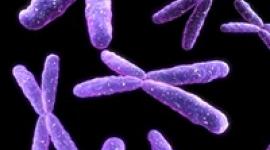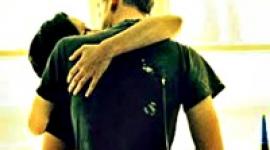Gays Scared of Sex
Gay people paralyzed by a fear of STDs need to know: Celibacy driven by terror can be bad for your health
In the spring of 2004, Tom Trevor met a cute guy while vacationing in Hawaii. They fooled around but didn't have sex, which remained a possibility for when the pair planned to meet in San Francis co. When he returned home to Los Angeles, Trevor sent an instant message to his Hawaiian hottie: "I'm HIV-negative. What are you?"
The reply "I'm HIV-positive."
Trevor panicked. "I called my sister and said, 'Oh, my God--what if I'd had bleeding gums?'" he recalls. "I need to make out my will." Trevor now admits his reaction was silly. Yet, despite knowing how HIV and other sexual diseases are spread and how to play safe, he still hesitates to have sex. "I don't date very often," he says. "Men can't be totally trusted."
Twenty years after researchers announced they had isolated file retrovirus that was eventually named HIV, a percentage of gay men and lesbians are still so scared of AIDS and STDs that they're hesitant to have sex, even with protection. The recent rebound in syphilis and HIV cases has fueled their fears. Syphilis cases rose in 2003 for the third consecutive year, according to the Centers for Disease Control and Prevention. Gay men made up 60% of syphilis cases, compared with 5% in 1999. HIV diagnoses increased 17% among gay and bisexual men in 29 states between 1999 and 2002.
Experts say there are much deeper psychological reasons that help explain why some people are scared sexless. Actually, there are many similarities between gay men and lesbians who practice unsafe sex and those who fear having sex. They don't understand how much risk they face and how to protect themselves, notes Marshall Forstein, assistant professor of psychiatry at Harvard Medical School.
"On one hand, there is no way a human being can look at life as being totally safe," says Forstein, who specializes in mental health care for people living with HIV and AIDS. "On the other hand, people who have unprotected sex misinterpret the level of risk or view [HIV] as treatable."
Forstein says it's not a bad sign if people are celibate because they're holding out for long-term relationships--as long as they keep dating. However, it is unhealthy if people become so anxious about sex that it leads to celibacy and they rely on porn or the Internet for sexual gratification. Then they are trying to isolate themselves from fear, he argues.
Antigay social and religious messages leave some gay men feeling that it is not a question of if they will become HIV-positive but when. "There are people who grow up hearing that homosexuality is evil, and they're told there is some intrinsic connection between AIDS and being gay, which there isn't," says psychoanalyst Mark Blechner, author of Hope and Mortality: Psychodynamic Approach to AIDS and HIV. "When they grow up hearing that, it doesn't just fall away."
Experts say that an abnormal fixation on STDs can be a sign of obsessive-compulsive disorder or hypochondria. The slightest feeling of fatigue can cause hypochondriacs to believe they have contracted HIV, even if their tests are negative and they have not been exposed to HIV. Brian Fanon, MD, coauthor of Phantom Illness: Recognizing, Understanding, and Overcoming Hypochondria, remembers one patient who had taken so many HIV tests that she was barred from taking them at labs in her city. Undeterred and unwilling to trust the test results, she went to New York and began another cycle of testing and immediate retesting. As with other hypochondriacs, the woman's negative test results provided temporary comfort before she panicked again and wanted additional testing.
"People like that will avoid sex unless they're 100% certain that the partners they're with are clean," says Fallon. "Then there's the other kind of hypochondriac. They are not usually hypochondriacal, but something bad happens that makes them feel guilty."
The latter is what happened to Kent, a 23-year-old San Francisco Bay Area resident who asked that The Advocate not use his last name. He abruptly stopped having sex after what he felt was a close call. However, a few months later he calmed down: "I finally [realized that] I'm free, and I'm not going to deny myself as long as I'm trying to be smart about it."
So how wary should gay men and lesbians be of contracting any STD, including HIV? "What we need to do is to make sure we've incorporated some basic protective behaviors into our sexual social etiquette," says Greta Batter, an assistant professor of public health at the University of New Hampshire. "Beyond that, each individual has to decide what level of risk to take and to be forthright with partners and prospective partners."
APA Reference
Staff, H.
(2021, December 21). Gays Scared of Sex, HealthyPlace. Retrieved
on 2026, March 1 from https://www.healthyplace.com/sex/articles/gays-scared-of-sex



